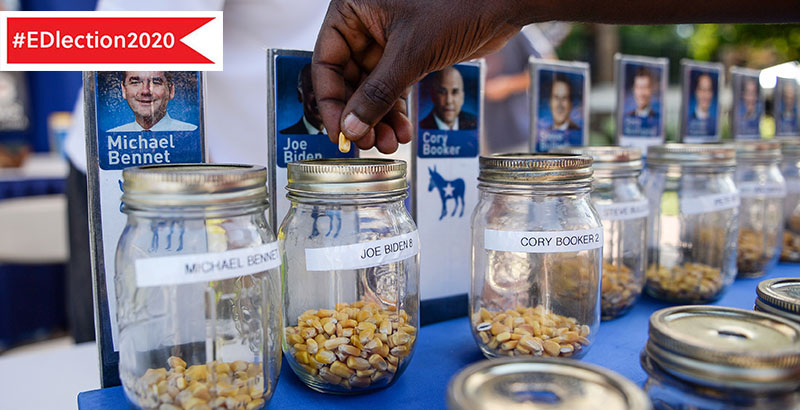Aldeman: The Iowa Caucuses Steer Our National Priorities. But Iowa’s Education Policies Are Bad for the Nation — and for Iowa

As a native Iowan, I am pained to admit this, but it must be said: The Iowa caucuses are bad for education policy and bad for democracy.
As we approach the Feb. 3 caucuses, it’s worth laying out all the ways Iowa’s role as the first contest of the presidential primary season distorts our education politics.
It’s common knowledge that Iowa is one of the least diverse states in the country. Nationally, about 60 percent of Americans and half of all K-12 students are white. In Iowa, 91 percent of residents are white, as are three-fourths of its K-12 students.
The caucus itself is famously undemocratic. Participants have to show up at a set time — 7 p.m. — and stay until the votes are all counted and the delegates apportioned. Although we don’t have good data on turnout among parents, these rigid rules certainly restrict who can take part in the process. For example, among Iowa caucus-goers in 2016, more than half had a bachelor’s degree or higher (nearly twice the figure for all Iowa adults). And, although the state is implementing a new system this year, the caucuses have historically relied on a delegate apportionment process that hinges on how well participants beg and plead for their neighbors to come to their side. (Trust me, I’ve been there.)
When it comes to certain policy areas, such as farming and agriculture, it’s easy to see how an unrepresentative sample of Iowans would result in policies that were unrepresentative of the rest of the country. Our national farm policies are at least partly shaped by the fact that our presidential candidates must kowtow every four years to local interest groups like the Iowa Farm Bureau, where my father worked when I was a kid.
The same applies to presidential contenders crafting their education policies, meaning an unrepresentative sample of Iowans play a quiet but powerful role in shaping our national educational debate. But are the education policies favored by Iowans any good? Are they worth spreading across the country?
The short answer is no. On education, Iowa is falling behind the rest of the country. Consider five ways in which Iowa is trailing other states:
- Teacher preparation: While the rest of the country has built a pipeline of alternative teacher preparation providers to attract more diverse candidates, 98 percent of Iowa’s teachers are still trained at traditional programs. As one signal of its lack of innovation, Iowa is one of the few states that’s never had a Teach for America corps member.
- Charter schools: Charter schools have grown to educate about 6 percent of students nationwide, with especially strong results for low-income children in urban areas. Iowa, in contrast, has three charter schools enrolling 0.1 percent of all students. Among the 44 states with charter schools, the National Alliance for Public Charter Schools ranks Iowa’s charter law worse than all but four.
- College entrance exams: Iowa City is home to the ACT test, but 22 states have a higher percentage of their students taking it. As many leading states have transitioned to paying for all of their students to take the ACT or SAT, with positive effects for low-income kids, Iowa has chosen not to do so.
- Accountability: My organization, Bellwether Education Partners, worked with the Collaborative for Student Success to convene a panel of independent reviewers of state accountability plans under the Every Student Succeeds Act. On Iowa’s plan, they concluded that it “lacks any specific actions the state would take in the event of persistent low performance.”
- A reform community: Iowa is one of 18 states without an education advocacy group. In a recent research paper looking at education advocacy spending by state, the authors found that Iowa’s teachers unions accounted for 100 percent of the money outside groups spent on education. Of that money, 100 percent went to Democrats in the most recent election cycles.
It’s not that Iowa isn’t doing anything well. Its schools are relatively well-funded, and Iowa pays its teachers well, especially in relation to the state’s cost of living.
Given the education policies that Iowa has chosen to pursue, and the ones it has not, it’s politically convenient for the 2020 Democratic candidates to tout policies that look a lot like Iowa’s: increase spending, without paying too much attention to what’s actually happening in schools.
Unfortunately for Iowans, these efforts haven’t produced any improvements in a long, long time. Iowa outperformed the rest of the country in reading and math in the 1990s and 2000s, but other states have now caught up. Iowa’s scores have been flat or stagnant for years, and its relative ranking among the states, even when adjusted for student demographics, has fallen from the top 10 to the bottom third.
I had always defended the Iowa caucuses for the same reasons people defend them now: Iowa is a small state where campaigning is inexpensive; Iowans take their role seriously as the first state to winnow the presidential field; Iowa was a purple state (historically, at least), so both parties could field competitive primaries. If all else failed, I would resort to asking, “If not Iowa, where?”
But over time, those arguments are looking worse and worse. In terms of education policy, Iowa is an outlier, and not in a good way. As sad as I would be to see Iowa lose its privileged status, it’s time to give other states a chance to take the lead.
Chad Aldeman is a senior associate partner at Bellwether Education Partners and the editor of TeacherPensions.org.
Get stories like these delivered straight to your inbox. Sign up for The 74 Newsletter

;)
